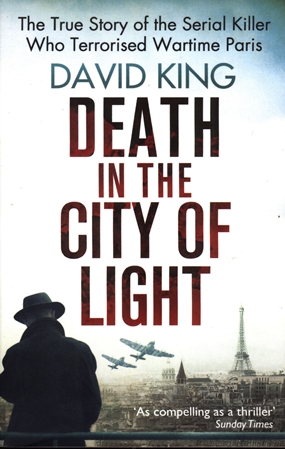Death in the City of Light is a thriller, in every sense of the word. However, as opposed to the many thrillers on the Bookazine Big C Extra shelves, Death in the City of Light (ISBN 978-0-7515-48 45-7, Sphere Publishers, 2011) is a true story.
It has, what all good thrillers should have, a murder or two (or many as in this instance), sex, drugs, a police inspector who is not the sharpest knife in the drawer, confusions and side tracks, and unfolds in wartime Paris with the Nazi occupation in full swing. But this is all true, remember! Author David King has not made any of it up.

Like a good fiction, author David King gives great detail. Even down to the number of the police car the Inspector used to pursue the murderer. Painstaking research on the author’s part. But this is all true, remember!
Real-life celebrities such as Pablo Picasso join the cast of thousands in this book, including John-Paul Sartre and it was with interest that I noted Sartre’s book reviews went on for 6,000 words. (More than mine, by several thousand!)
The actual reason(s) given credence by the public for the serial killings outlined in the book ranged from madness to depravity and all human characteristics in between. In the absence of the presumed murderer, everything was guesswork, rather than sleuthing, something that was not being shown by the police.
Now throw in the wild card of the French Resistance fighters and illicit passages out of France and away from the German occupation, run by gangsters, not patriots, and it becomes even more intriguing. Tickets and visas to Argentina were sold to the highest bidder, so forget the concept of ‘noblesse oblige’.
This era of German occupation of Paris (the City of Light) is fascinating, and the historical aspect as written by author David King is somewhat different from that in the popular history books. Collaboration seems to have been the collective ‘plat de jour’, other than for the increasingly oppressed Jews.
Another character to be dragged into the plot is the fictitious policeman Jules Maigret from the pen of Georges Simenon, whose persona is said to have been modeled upon the Police Inspector Massu, the one who sought the presumed murderer for three years.
When the murderer was finally apprehended, his trial under French law took months going into years. It was described as “the most sensational criminal trial in modern French history.” The various nuances of French law are explained for the Anglo-Saxons for whom the book was written.
At B. 468, this is a steal. A book that will keep you occupied for days, and awake for as many nights. Notes and a bibliography take up the final 80 pages in a blockbuster of a book! It is not a thriller you can just skim through as author King gives you so much detail. He gives special thanks to the Prefecture de Police for granting him access to the dossier, which had been regarded as classified information up till his getting hold of it.




